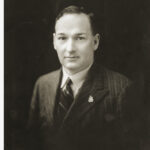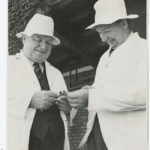A Baptist minister and Waterloo veteran with a dragoon’s pension, South Australia’s first Thomas Playford arrived in 1844 to claim an inherited original town acre. Thus financially independent of his church congregation, he was free to establish further local congregations, write religious works, and tend a small farm at Mitcham. He died in 1873.
Thomas Playford (1837–1915)
Thomas’s eldest son, Thomas Playford (1837–1915), was a successful orchardist at Drysdale, Norton Summit, in the Adelaide Hills. Drawn to politics, tactlessness marked his initial term representing Onkaparinga, 1868–71. He told the House of Assembly he ‘believed the stinkwort came from Germany, and was not the only weed that came from that country’. Coming from the representative of the German settlements of Lobethal and Hahndorf, while pointing at a German-born parliamentarian, it is no surprise that this gaffe produced electoral defeat. Returning to the House of Assembly in 1875, Playford thereafter served four electorates and held several offices including premier from 1887 to June 1889 and again from August 1889 until he resigned in 1892. Politically, he was a moderate protectionist and federalist, a land-reformer and member of the conservative Australasian National League. He opposed Chinese immigration but favoured importing temporary Indian labour to the Northern Territory. In office he reduced state debt and introduced salaries for members of parliament. He served as a South Australian senator in the first federal parliament until defeated in 1906. A firm and sometimes forcefully blunt man, his political integrity earned him the name ‘Honest Tom’. He married Mary Jane, daughter of Rev. W. Kinsman in 1860, and left five sons and five daughters. Until death, Thomas maintained an intimate relationship with a Melbourne woman. Rejecting royal honours, he refused a knighthood.
Tom Playford (1896–1981)
Thomas’s grandson, Tom Playford (1896–1981), also went into parliament, becoming Australia’s longest-serving premier (1938–65). Playford’s supporters regard him as the state’s greatest leader, pointing to projects such as low-cost housing, establishment of the industrial city Whyalla, opening of the Leigh Creek coalfield, relief of semi-arid country areas with piped River Murray water, centralising of the state’s power supply, and encouragement of manufacturing. Other commentators view these as inevitable companions to the end of economic depression, Commonwealth investment in war industry, and the post-war consumption boom. Increasingly criticised because his policies appeared to neglect the state’s diverse post-war population, Playford eventually lost office to Frank Walsh’s Australian Labor Party government in 1965, becoming opposition leader until his retirement in 1967. He had served overseas with the first AIF and, in 1928, married Lorna Clark; they had three children. Playford was made GCMG in 1957.






Comments